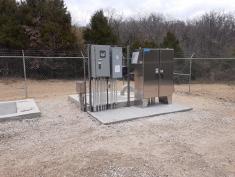
4 minute read
Importance of Training for Clerks and Board Members
Valarie Main, TMF Specialist
Advertisement
The headline reads: “A former clerk of Silver City, Iowa was sentenced to 10 years in prison Monday after pleading guilty to first-degree theft.”
This is a headline that all too often overshadows small towns or water districts. We attend conferences and listen to the same song and dance at least 10 times a day while there with other clerks. Please don’t get me wrong, no story is word for word the same and everyone seems to have a different variation of what occurred during their predecessor’s time in office. After talking to cities, many times this type of crime goes unpunished or is handled internally with little to no consequences.
Is justice served if you spend additional city funds to the tune of thousands of dollars on legal teams to sort through and deal with the wrongdoing? Is it justice to slide it under the table and wash our hands of it because it will cost too much to prosecute? Even worse, is pursuing justice worth the trust we’ll lose from our residents/customers knowing that we had an issue with those employed to serve the community? Many cities have decided to just handle it quietly, so they don’t lose the trust of their residents.
As clerks, many of us feel it is our duty to protect our cities from harm and to protect our cities’ finances as if they were our own. A lot of us do exactly that. However, more and more we hear of employees that do not. This is the area extremely near and dear to my heart. What is the fix here? How do we protect our cities from being the victim? Furthermore, how do we protect the clerks who are accused of wrongdoing by small town gossip when they’ve done no wrong?
Small towns do not have a big surplus of money and that is the way it should be. I feel a city should be running a close budget with incoming and outgoing funds. The “extra” should be used to improve infrastructure and the town itself. After all, a city isn’t spending its money, it is spending the money of its residents. I have not found the fix-all solution, but here are a few suggestions that I think may help:
• Board and Council Training - This is the very first step. A lot of small systems have board members that do not collect a paycheck from the city or water district. The elected officials do not have the time to dedicate to understanding what it is they do or how important it is for them to stay alert to possible issues. Some don’t know how to spot possible issues. It is vital that decision-makers understand what is and what is not presented to them at the meetings. Financial statements have a lot to say about the city’s/district’s financial position. If decision-makers cannot discern the data given them in the financial statement, then they likely aren’t looking for issues. When your board becomes a “yes board” that is when things go astray.
• Clerk Training – I hear office personnel frequently say, “I am the only one in the office. We can’t just close so I can go to training,” or “we are a small system, we just can’t afford to go.” My response to this is always the same. YOU
(continued on page 28)
(continued from page 27) CAN’T AFFORD NOT TO! We all know that operators receive training and that it is budgeted because it is necessary for them to be certified for system compliance. But can we talk about the clerks? How many small system clerks do you know that have experience with governmental duties before being hired for the city or district? The clerk is, in most cases, the gate keeper to the city’s records and financial functions. Is that truly someone we do not want to send to training?
• Audits – Please don’t get me wrong, I know audits are expensive!
I understand that it is hard to budget for things like this! However, if you don’t have a board of alderman that are accountants looking through the financial documents being submitted to them (or if you aren’t getting financial statements at all presented to your board) this is a GREAT way to discover discrepancies.
• Insurance – The board should have an insurance policy that covers any employee liability and/or have a policy that requires any employee who handles the city’s money be bonded. This is a safety that is put in place in case things go wrong.
• MRWA – we are here to help!
We want to help you protect your city/district. We want to help your clerk succeed. For more information on training for clerks and Board & Council Training, visit the MRWA website.


The Power of Association
Only the National Rural Water Association can bring together this unique Products & Services Portfolio designed to meet the needs of utilities.
Call 800-545-1054 for more information or visit nrwa.org!
*Availability may be limited in some states.
SMICO CONTRACTING
• Water/Wastewater Treatment Plant Rehab • Valve Replacement/Repair • Flowmeter Replacement • Pump Replacement/Repair • Manhole Rehabilitation • Jetter/Vacuum Services • Lift Station Rehab/New Installation • Piping and Manhole Inspections Contact Us Today!

Office: (816) 229-2244
Darryl Smith: (816) 582-9521 Tim Trigg: (816) 699-9141 Mason Smith (816) 651-3527 Email: SmicoConstruction@Smico1.com Website: smicocontracting.com












